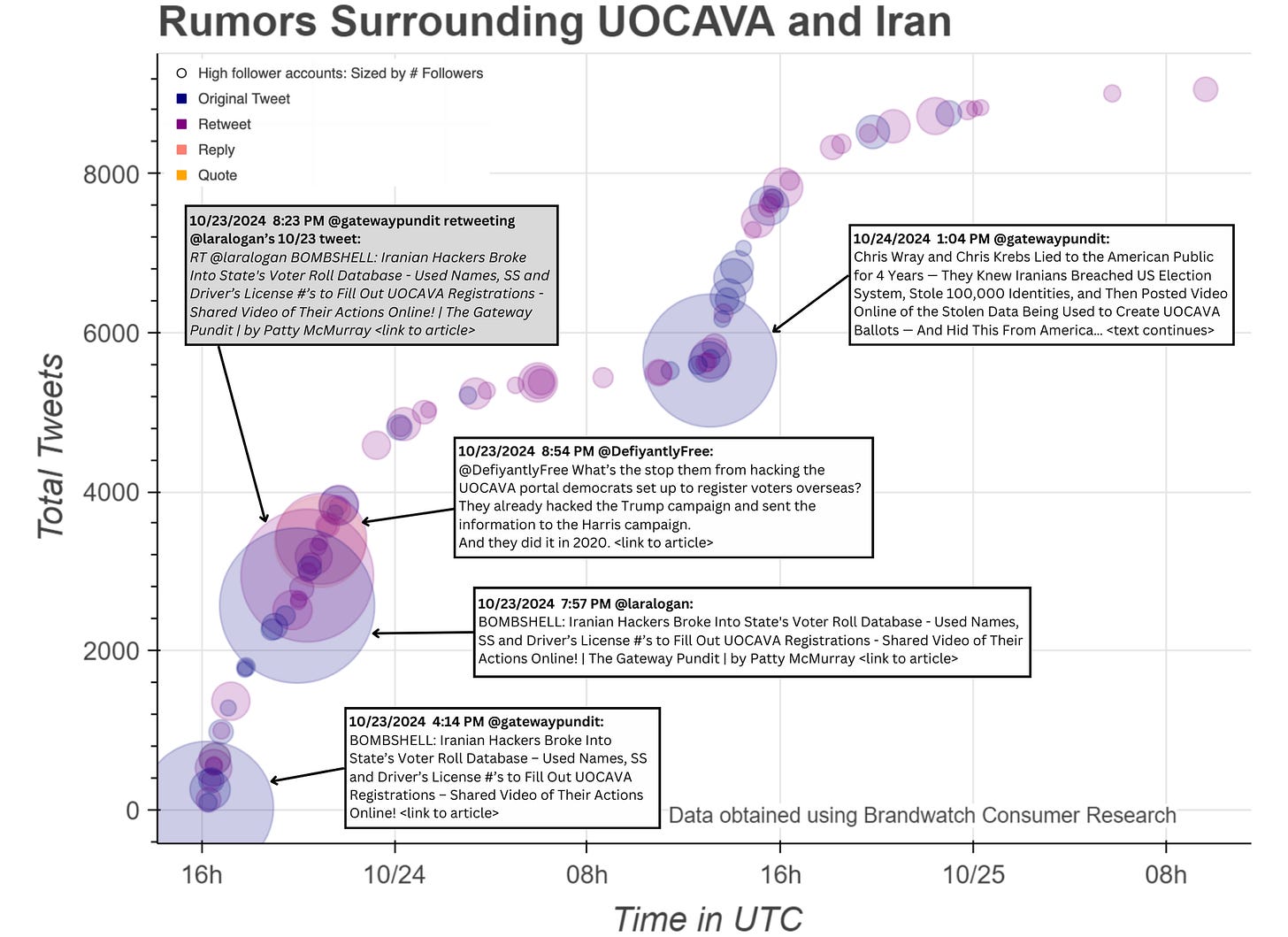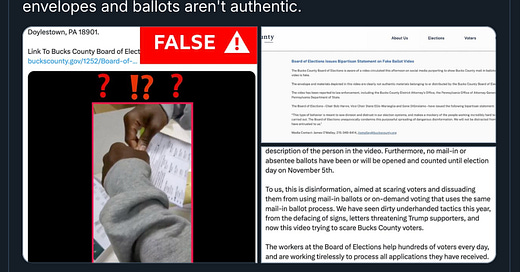Rapid Research Memo October 28: Early voting opens, claims of “illegal” or suspicious activities at the polls and at drop boxes increase
Weekly Memo
As we race towards Election Day, we’ll be producing our usual “weekly” rapid research memo twice a week. Each memo captures the emerging rumors we’ve been seeing across social media in recent days.
This collection highlights novel or viral rumors our researchers have identified using a combination of qualitative, quantitative, digital ethnographic, and visual, methodologies. Some of these rumors have been featured in longer analysis pieces on our Substack newsletter (linked below). Many of these rumors are false, but some may be true or partially true. Often, they are misleading in one of five familiar ways, as we discuss in this analysis.
If you are a journalist, researcher, or election official who would like more information on a particular rumor, or wish to speak to the CIP research team about our ongoing rapid research findings, you can contact us using this Google Form.
This Week On Our Substack
We put out longer analysis pieces as well as shorter rapid research blog posts on our Substack. Last week we published several rapid research items including: a follow-up post about the UOCAVA lawsuits filed in swing states. We also published rapid research notes on “Fake mail-in ballot envelope sparks rumors” and “Florida sues the Department of Homeland Security for citizenship data, sparking rumors.”
Emergent Rumors
Students in Wisconsin received intimidating texts telling them not to vote in “a state where you’re not eligible”
Posts on X shared a news clip reporting that college students in Wisconsin received threatening text messages saying they will be prosecuted for voting from campus housing. The League of Women Voters of Wisconsin alerted the State Attorney General to the messages and has asked for an investigation.
Left-leaning posters described the texts as “voter fraud” — arguing that they constituted an attempt to intimidate student voters.
Wisconsin students who have lived in one voting area for 28 consecutive days, and intend to stay, can vote in that district using their campus address.
Announcement that Maricopa County could take 10-13 days to count votes sparks misleading rumors of intentional delays
In Maricopa County, Arizona election officials announced that they expect to take 10 to 13 days to tabulate ballots after Election Day.
This was met by suspicion from posters on X who suggest the announced counting time are intentional efforts to enable voter fraud.
Longer vote counts are not abnormal in Arizona – in 2022 officials suggested that it would take 12 days to count votes. People familiar with Arizona politics know that these longer vote counts have been normal for years because of high use of early voting. (In 2014, it took nearly a month to count ballots in an extremely close House race). This longer yet normal counting period has been cast or misinterpreted by some as suspicious.
X account End Wokeness shared a news video from Arizona about the delays, discussing the length of vote counting compared to other country’s electoral processes. Elon Musk re-shared the post adding that “our system is broken.” Commenters on the post expressed dissatisfaction and distrust in vote counting because of the extended timeline, with some more explicitly arguing that the delay was intended to allow Democrats to cheat.
On Facebook, media personality Ben Swann echoed similar concerns to his over 500k followers, arguing that such delays engendered distrust as the public “feel like what you’re doing is that you’re waiting to see how many votes you need to manufacture in order to swing the election.”
Claims that Michigan has “more voters than its voting population”
Rumors continue around the widely debunked claim that Michigan voters have “more registered voters than eligible citizens.”
The claim, boosted by Elon Musk, has been fact-checked as false by VoteBeat and PolitiFact in addition to clarification from Michigan Secretary of State Jocelyn Benson who posted on X that there are actually 7.2 million registered voters in a state of 7.9 million citizens of voting age.
While sharing of the claim seems to have slowed since being widely debunked, posters on X are still repeating the statistic, arguing that voter rolls are “bloated” and need to be purged before Election Day.
Ballot drop-offs continue and early voting opens — claims of “illegal” or suspicious activities at the polls and at drop boxes increase
As polling locations have opened for early voting across the country and poll watchers are being trained ahead of Election Day, we are beginning to see more and more rumors around assumed “illegal” and suspicious activities at the polls, including some early stories about violence at in-person voting locations.
On X, posters shared a video from a Republican poll watcher who claimed in a 10-minute long video that illegal immigrants would be allowed to vote in Iowa. In the video, the poll watcher highlights that they are allowed to, and were instructed to, question an individual’s citizenship should they have reason to believe an unregistered voter is not a citizen. However, they argue that they felt uncomfortable confronting individuals, and that voters would still be allowed to vote with a provisional ballot with a different kind of envelope than other voters. The poll watcher then explains that voters using these ballots will have to later provide proof of citizenship for their vote to be valid. Despite this, the poll watcher argues that the supplementary ID is not sufficient to prove citizenship and that they didn’t trust the election workers overseeing the process.
This echoes earlier claims from Texas around the use of driver’s licenses.
Also on X, users shared a news story from Patriot United News falsely claiming that a Democrat operative was caught on camera trying to tamper with a ballot drop box in Montana. The claim was also shared by Laura Loomer on X with Loomer adding that the staffer allegedly attempted to rip the drop box off the column it was attached to. Glacier County, Montana police investigated the matter, determining that the video did not “constitute a legitimate attempt to tamper with the ballot box or the electoral process.” A spokesperson for the Democratic Senatorial Campaign Committee argued that the operative was attempting to ensure the ballot box was secured to the wall.
A viral post on X (admitting in the thread that it is a paid advertisement) claimed that Democratic poll workers in battleground were changing ballots from Trump to Biden using Dominion Voting Systems machines. Linking to a website America Mission Inc., the website hosts a video allegedly from an Arizona “election integrity hearing” claiming machines switched votes from Trump to Biden. Commenters on the post did not appear to believe the post and instead questioned why the post was allowed as a paid advertisement.
Rumors spread alleging that Iran hacked a state’s voter rolls and used UOCAVA provisions to fill out ballots
Last week we saw renewed discussion alleging vulnerabilities in UOCAVA when the Gateway Pundit published an article on October 23 alleging an Iranian hack to acquire personal identifiable information of US citizens to vote via the UOCAVA program.
The Gateway Pundit included a video that allegedly shows Iranians hacking a U.S. voter registration database to create UOCAVA ballots. However, this video and its claims – previously shared in 2020 and 2022 – were already debunked; the video was part of an Iranian disinformation campaign aimed at sowing distrust in election security. There is no evidence that vote totals were changed. The two Iranians involved were indicted.
The next day on October 24, Gateway Pundit published another article claimed that former Cybersecurity and Infrastructure Security Agency (CISA) Director Krebs and current Federal Bureau of Investigations (FBI) Director Wray knew about this alleged hack and were hiding it from the American people.
This rumor misleads the public by sharing manufactured evidence, created by a foreign disinformation campaign, that has previously been debunked.

Pennsylvania nuns falsely accused of voter fraud
Users on Telegram discussed rumors that one address in Erie, Pennsylvania was found to have 53 registered voters. The post reshared information found via X that alleged that the address belonged to the Benedictine Sisters of Erie but that in reality “nobody lives there.”
Responding to the rumors, the Benedictine Sisters of Erie put out a news release calling the claims, originally made by a GOP operative, “blatantly false” highlighting that the nuns do indeed live at the address.
Ballot box fires in multiple locations (AZ, OR, WA)
This section was updated late evening, October 28, to include more information about the unfolding stories and rumoring dynamics.
Last week, the U.S. Postal Service mail collection box in Phoenix was set on fire overnight in what was believed to be arson. Investigators found a number of mail-in ballots damaged by the fire but it is not known whether ballots were the target of the blaze. Addendum: Police have arrested a man suspected of setting the postal box on fire. It does not appear to be connected to the fires in Oregon or Washington.
In Vancouver, Washington, a ballot dropbox was set on fire just after 6 a.m. on Monday, October 28. The Clark County auditor announced that the last ballot pickup occurred the previous Sunday morning at 8 a.m. and urged voters who dropped off ballots after that time to contact the Auditor’s Office.
In addition, an incendiary device was discovered inside a ballot box in Portland, Oregon causing a fire. Both ballot boxes are in the same metropolitan area, despite being in two states.
Addendum: Discussions of the ballot box arson attempt in Vancouver, Washington, were prevalent on Bluesky. Most prominent posts focused on communicating news reporting on this incident and on relaying information on how impacted voters. A minority while some users connected these incidents to rhetoric from Trump, or local chapters of the Proud Boys and other far-right groups, blaming them for these incidents without evidence.
Compared to other election administration-related discussions on Bluesky we’ve seen, this one seems to have reached particularly high and sustained attention (Figure 2)

Odds and Ends

Last week, we saw a viral video (Image 1) allegedly showing someone destroying ballots marked for former President Donald Trump in Pennsylvania. The video was fake and government officials have reported it was part of a Russian disinformation campaign.
Mesa County, Colorado reported that several mailed ballots were intercepted and cast before the intended voters received them. Officials discovered the issue during a signature verification process, part of election security practices. Conversations spread about this county in particular because the former county clerk, Tina Peters, was recently sentenced to prison for tampering with voting machines in an effort to prove election fraud.


